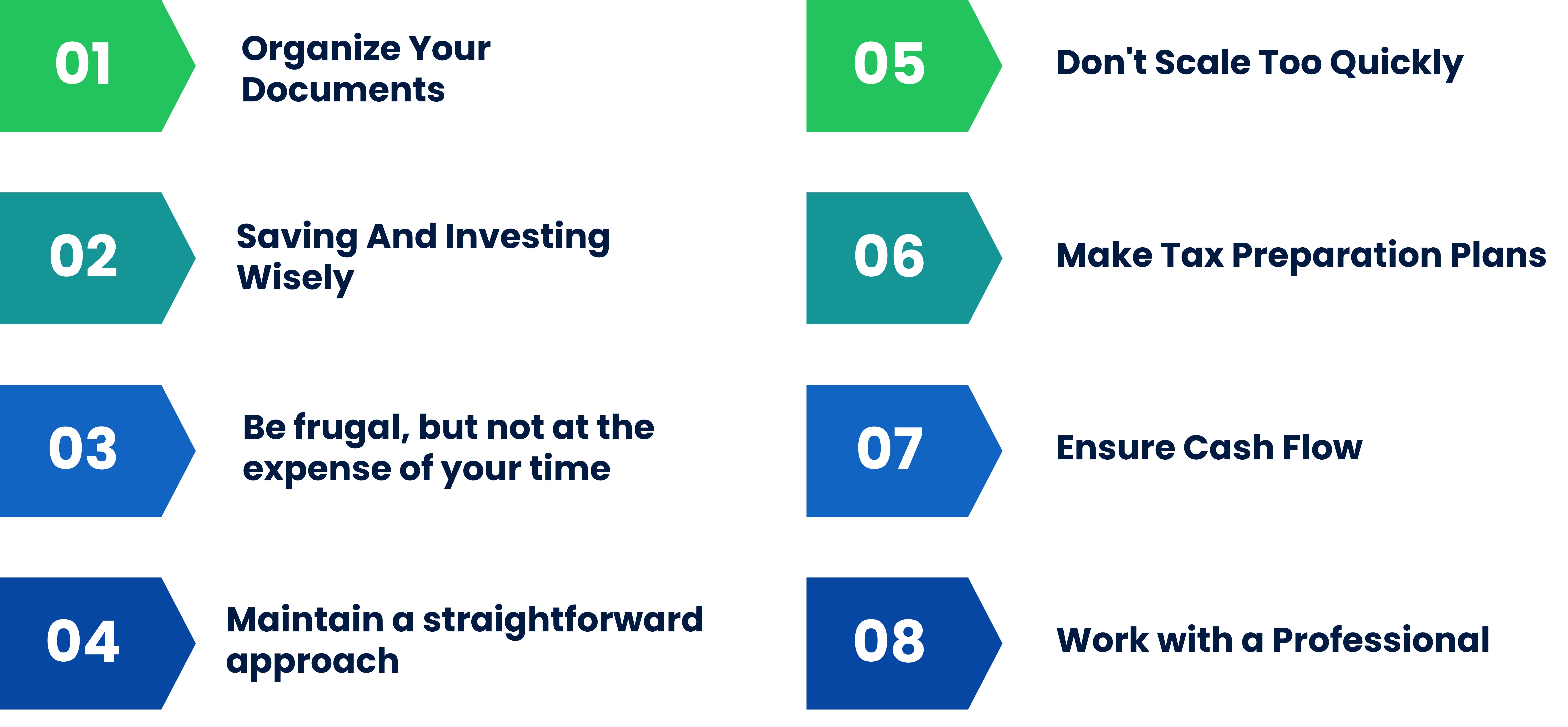Starting a firm for the first time is likely to be the most significant step ahead in your professional career — and it comes with understandable financial and reputational risks. However, if you have the appropriate information, you may reap the benefits of financial independence and, eventually, authority over your own destiny.
8 Financial Tips for Launching a Start-Up
There is nothing we can say to make starting a business easier for you, but reading our 8 financial recommendations for entrepreneurs founding a business can help you plan for success while avoiding the all-too-common traps of startup culture.

Organize Your Documents
It can be difficult to organize your records and other information while you're new to running a business, but it's critical to do so so that it doesn't become an issue or a bother in the future. You could get into legal trouble and suffer fines or penalties if you don't keep track of your finances properly. You may organize your data and funds into categories so that they are easy to find and don't give you any frustration.
Saving And Investing Wisely
Most new business owners want to get started right away and invest in a nice workplace and furniture. All of stuff is unnecessary, especially at first. Begin small and work your way up. If you're selling a product, you don't need to worry about having hundreds on hand right soon. As clients buy, create the goods on demand. You want to be able to change as needed while you're first discovering out what your clients need and want. Always keep in mind that growing your company, your team, and your product or service takes time. Begin slowly and adjust as needed. You'll eventually come up with a budget and determine what works best for your company.
Be frugal, but not at the expense of your time.
Being thrifty entails considering the return on investment. Let's say someone wants to sell you AED 1,000 worth of marketing services. Is it going to bring in AED1,000 in revenue? People will try to sell you things that don't provide value, so always ask yourself, "Does this add value to the customer?" The flip side is that you should value your time. It's all too simple to think, "I'll save AED 50 if I do it myself." However, if it takes three hours and you can get an accountant to handle it instead, you'll save a lot of time—time you can spend giving value to your clients and growing your business. Set an hourly rate for yourself. A large one, as AED 500. When something takes an hour of your time that you should be spending on customers and someone else can do it for $200, it's a great deal.
Maintain a straightforward approach.
Maintain simplicity by remembering that profit = revenue minus expenses. Too many individuals will try to advise you on gross margin analysis, profit per input, profit per hour, and other topics. These are all really important but start with the basics and work your way up. Pay yourself first, as well. Too many business owners believe their company is extremely profitable yet refuse to pay themselves. You're depriving yourself of the reward of your labor and your company of proper financial reporting if you don't have a constant wage. Start paying yourself on a regular basis right now.
Don't Scale Too Quickly
You must always begin lean. Keep your team small and don't get too enthused about growing it too quickly. When things get rough, it'll be tempting to hire more people, but that's exactly when the tough start going. Spend your money on improving your processes and the quality of your output.
Make Tax Preparation Plans
First-time self-employed individuals sometimes overlook their tax requirements throughout the year, leaving them with an unpleasant surprise in March and April. Taxes must be factored into small business financial planning and budgeting. You should organize your business operations throughout the year to take advantage of the tax legislation. Everything you do, from forming an LLC or an S-corporation to recruiting staff and acquiring equipment, has an influence on your taxes. You should also make a monthly budget to pay your taxes. Hiring a CPA is the best method to arrange for taxes. Hiring a CPA is the best method to arrange for taxes. A good CPA is well worth the money. They'll educate you on the many forms of taxes and make sure you don't have any unpleasant surprises when it comes to filing your taxes.
Ensure Cash Flow
The monarch of the financial world is cash flow. "It's the CEO's job to maintain cash in the bank and define strategy," someone wise once told me. For many business owners, the epidemic served as a wake-up call. Those that prioritized keeping cash on hand had the freedom to borrow more, make strategic investments, and pivot in the midst of a crisis. We had a fairly good borrowing base for our size of business moving into 2020, and it allowed us to start a whole new business in 2020.
Work with a Professional
Engage the services of a bookkeeper. Hiring someone who is more knowledgeable in this area than you and who can prepare you for tax season, pay your team, and provide you with guidance when making financial decisions is invaluable. Bookkeepers are relatively inexpensive and well worth the price. You should be in your sweet spot, not thinking about this aspect of the business save for making sure you are aware of your P&Ls.
Conclusion
There are numerous things that can be overwhelming if you're just starting out in business. Finances, on the other hand, are one of the most common sources of stress. Business Loans can rapidly become too much for young entrepreneurs to handle, with so many figures to track, livelihoods to be responsible for, and rules to follow. We hope that above financial tips would help you in your new venture, for company set up and other business activities connect to us at Dhanguard.

